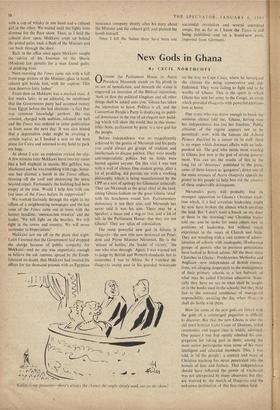New Gods in Ghana
By CECIL NORTHCOTT OUTSIDE the Parliament House in Accra President Nkrumah stands on his plinth in an act of benediction, and beneath the statue is engraved an inversion of the Biblical injunction, 'Seek ye first the political kingdom and all other things shall be added unto you.' Ghana has taken the injunction to heart. Politics is all, and the Convention People's Party is displaying its politi- cal dominance in the rise of an elegant new build- ing which will show the world that in this mono- lithic State, parliament by party is a new god for the people.
Before independence was so magnificently achieved by the genius of Nkrumah and his party you could always get groups of students and intellectuals to discuss politics. They were mostly anti-imperialistic politics but no holds were barred against anyone: On this visit I was met with a wall of silence. One student group, after a lot of prodding; did provide mc with a working philosophy which is being manufactured by the CPP as a sort of apology for Ghanaian statecraft. They see Nkrumah as the great chief of the land, sitting Ghana-fashion on the great Ghana 'stool' with his henchmen round hint Parliamentary democracy is not their aim, and Nkrumah has never said it was his aim. There may be a Speaker, a mace and a wig or two, and a lot of talk in the Parliament House—but they are not Ghana! They are relics of colonialism.
The most powerful new god in Ghana is Osagyefo—the new title now bestowed on Presi- dent and Prime Minister Nkrurnah. He is the 'winner of battles,' the 'leader of victory,' the one who wins through.' Again, I was warned not to judge by British and Western standards, but to remember I was in Africa. So I watched the Osagyefo sweep past in his guarded motorcade
'Callas is my favourite—there's always the chance she might simply walk out on the show:.
Oil the way to Cape Coast, where he harangued the citizens for being conservative and old- fashioned. They were failing to fight and to be worthy of Ghana. This is the spirit in which Ghana has sent her army to the Congo, an event which provided Osagyefo with powerful ammuni- tion at home.
One cynic who was brave enough to break the ominous silence told me, 'Ghana, having on her independence, has lost her freedom.' Public criticism of the regime appears not to be permitted: now, with the famous old Ashanti Pioneer shackled by a censor on its staff, there is no organ which discusses affairs with an inde- pendent air. The god who needs most worship in Ghana just now is the god of strong govern- ment. You can see the results of this in the long list of 'detainees' published in the press. some of them known as 'gangsters'; down one of the main avenues of Accra Osagyefo appeals by poster to his people to help him rid the country of these undesirable delinquents.
Nkrumah's party will probably find its strongest opposition in Ghana's Christian tradi- tion which, if it had articulate leadership, might by now have broken the silence which envelops the land. But 'I don't want a knock on my door at three in the morning,' one Christian leader told me; and he spoke for many others now in positions of leadership, but without much experience in the issues of Church and State. They are wrestling with a vast system of admin- istration of schools with inadequate, ill-educated groups of pastors who in previous generations have looked to British advice. All the three nlain Churches in Ghana--Presbyterian, Methodist and Anglican—now independent of British connec- tions, are clinging desperately to the management .of their primary schools as a last bulwark of what may be called Christian education. Ironi- cally they have no say in what shall be taught, or in the books used in the schools; but they hold fast to the outward semblance -of managerial responsibility, awaiting the day when Covil;, fo shall do battle with them.
How far some of the new gods arc linked \N ith the gods of a submerged paganism is difficult to discover: But that the new Ghana is also the old pre-Christian Gold Coast of libations, tribal ceremonies and • pagan rites is widely admitted. One pastor I met had openly rebuked his con- gregation for taking part in them; among the most active participants were some of his most intelligent and educated members. This, t was told, is 'of the people'; a century and more of Christian teaching has never penetrated into the bowels of fear and fantasy. That independence should have inflamed the power of witchcraft was not unexpected by many observers; but they are worried by the march of Osagyefo and the unknown destination of this fear-ridden land.










































 Previous page
Previous page